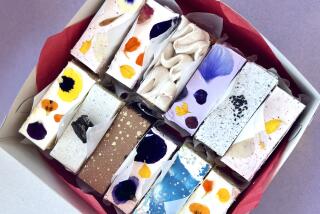The greening of the mooncake
- Share via
BEIJING — With the Mid-Autumn Festival fast approaching, Yang Haijuan dropped by the posh China World Hotel to pick up three deluxe sets of mooncakes, gifts for her friends.
She’d chosen the eight-cake “Autumn Elegance” boxes, covered in golden fabric and embroidered flowers, at a cost of $63. Each came in a thick, sparkly, gold and red shopping bag with rope-like handles.
“I’m buying more this year and spending more than last year,” said Yang, a human resources specialist. But she’ll get even more boxes of pastries than she’ll give: Yang expects to receive up to 20 boxes, from colleagues, friends and family members as gifts for the festival, which is Sunday.
Neighborhood recycler Lu Shoujun knows mooncake season means one thing: more trash. About 10 days from now, Lu will start to get calls from his regular customers, clamoring for him to collect mooncake boxes along with their newspapers, cardboard and other usual items.
“Some people get so many that we have to go upstairs to their apartments and haul them down,” he said.
China is rapidly transforming from a rural nation to an urban one, and officials are pushing to “rebalance” the economy so that consumer spending accounts for a bigger share of gross domestic product. Ever-greater numbers of city dwellers eager to buy fancier things have created vast new business opportunities, but the environmental costs are also on the rise.
China has surpassed the United States to become the world’s largest trash producer, churning out more than 260 million tons a year. Beijing’s 20 million residents generate about 18,000 tons a day, most of which goes to landfills. With household trash volume rising at least 5% annually, according to the city, authorities are building new incinerators, though that’s caused concern about further dirtying the capital’s already smoggy skies.
Mooncake-related refuse is just a small part of the problem. But much like Christmas wrapping in the West, it’s attracting attention from activists seeking to raise public awareness, encourage greener business practices and nudge bureaucrats to enforce environmental regulations already on the books.
This year, the nation is expected to produce 280,000 tons of mooncakes, with sales reaching $2.53 billion, up 6% from a year ago, Zhu Nianlin, president of the China Assn. of Bakery & Confectionery Industry, told China’s Global Times newspaper. But high-end mooncake purveyors report much stronger growth.
Mooncake sellers spent more than $300 million on packaging in 2010, including 200,000 tons of paper and 40,000 tons of tin, according to the China General Chamber of Commerce.
A Beijing-based environmental group, Friends of Nature, says more than 95% of the packaging is unnecessary, and even when the material can be recycled, the process uses energy and can contribute to water and air pollution.
This year, China’s Zero Waste Alliance has launched a campaign to get users of Sina Weibo, the nation’s Twitter-like microblog service, to take pictures of excessively packaged mooncakes. The group plans to collect the photos and compile a list of the most egregious offenders.
“We need to get customers to change their habits,” said Tian Qian, urban solid waste coordinator for Friends of Nature, which is part of the campaign. “Manufacturers are important too, as they are directly involved, and we believe some companies are violating the national law.”
Several years ago, China adopted regulations on mooncake boxes. Among the guidelines: Only three layers of wrapping are allowed, and cakes must occupy 40% of the box volume. The cost of the package should be no more than 25% of the wholesale cost of the cakes.
But Tian noted that items like the plastic trays under the cakes, as well as the bags the boxes are placed in, are not counted as layers by government inspectors.
Lu, the neighborhood recycler, said increasingly elaborate packaging means more work and a lower profit for him. He and his workers often must use knives to separate the boxes’ paper from plastic and other materials: leather, wood, fabric, even ceramic tile.
“Labor costs are going up, the price we get for the materials is going down,” said the 40-year-old Lu, who cut his staff from four to two men this year and now washes cars part-time. “Sometimes, we just have to throw the stuff out.”
Excess packaging not only contributes to solid waste but also adds to fuel use for transportation and, thus, air pollution.
Many Beijing residents grouse that mooncake mania adds to traffic in the week before the Mid-Autumn Festival, as people scurry around town buying cakes, delivering them and picking up other cakes with vouchers they’ve been given by their employers or friends. City officials said the capital’s traffic congestion index on Tuesday hit 9.8 out of 10, the worst reading of the year.
Yan Ning, director of food and beverage for the China World Hotel, has seen demand for his highbrow mooncakes grow rapidly in the last 10 years. This year, his hotel expects to rake in nearly $2.4 million selling 100,000 boxes in 13 styles and 33 flavors, up from 20,000 boxes a decade ago. Corporate clients account for half of his sales.
Each year, he works with a designer to come up with fresh look. Designs for 2012 include a $93 jewelry-box-like item with drawers, and a $74 red leather case with gold handle. “You have to make something elegant, something distinctive,” he said. “You can’t make the same design each year.”
Yan said he tries to stay away from metal and wood out of environmental concern, and this year the hotel is again offering a special “charity” box; the hotel will make a contribution to a wetland park for each purchase of that design.
Selina Lee, who oversees mooncakes for the Hong Kong Jockey Club’s Beijing clubhouse and says sales have risen about 40% annually for the last five years, said she tries to keep the packaging to the minimum, using paper and environmentally friendly glue. But changing customer habits can be hard.
Last year, she said, the club introduced a box design that included a handle, so that buyers would not need a shopping bag to carry the mooncakes. “They didn’t like it,” she said. “We had to go back to bags. I don’t think the market is looking at environmental concerns. But we are trying to make it eco-friendly.”
Nicole Liu of The Times’ Beijing bureau contributed to this report.
More to Read
Sign up for Essential California
The most important California stories and recommendations in your inbox every morning.
You may occasionally receive promotional content from the Los Angeles Times.














